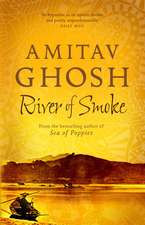The Glass Palace
Autor Amitav Ghoshen Limba Engleză Paperback – 31 ian 2002
Vezi toate premiile Carte premiată
"A rich, layered epic that probes the meaning of identity and homeland- a literary territory that is as resonant now, in our globalized culture, as it was when the sun never set on the British Empire."-Los Angeles Times Book Review
Set in Burma during the British invasion of 1885, this masterly novel tells the story of Rajkumar, a poor boy lifted on the tides of political and social chaos, who goes on to create an empire in the Burmese teak forest. When soldiers force the royal family out of the Glass Palace and into exile, Rajkumar befriends Dolly, a young woman in the court of the Burmese Queen, whose love will shape his life. He cannot forget her, and years later, as a rich man, he goes in search of her. The struggles that have made Burma, India, and Malaya the places they are today are illuminated in this wonderful novel by the writer Chitra Divakaruni calls "a master storyteller."
Praise for The Glass Palace
"An absorbing story of a world in transition, brought to life through characters who love and suffer with equal intensity."-J. M. Coetzee
"There is no denying Ghosh's command of culture and history. . . . [He] proves a writer of supreme skill and intelligence."-The Atlantic Monthly
"I will never forget the young and old Rajkumar, Dolly, the Princesses, the forests of teak, the wealth that made families and wars. A wonderful novel. An incredible story."-Grace Paley
"A novelist of dazzling ingenuity."-San Francisco Chronicle
| Toate formatele și edițiile | Preț | Express |
|---|---|---|
| Paperback (3) | 66.66 lei 3-5 săpt. | +20.59 lei 4-10 zile |
| HarperCollins Publishers – 6 iun 2024 | 66.66 lei 3-5 săpt. | +20.59 lei 4-10 zile |
| HarperCollins Publishers – 18 iun 2001 | 71.62 lei 3-5 săpt. | +16.38 lei 4-10 zile |
| Random House Trade – 31 ian 2002 | 102.70 lei 3-5 săpt. |
Preț: 102.70 lei
Nou
19.66€ • 21.36$ • 16.52£
Carte disponibilă
Livrare economică 31 martie-14 aprilie
Specificații
ISBN-10: 0375758771
Pagini: 512
Dimensiuni: 135 x 205 x 27 mm
Greutate: 0.38 kg
Editura: Random House Trade
Locul publicării:New York, NY
Notă biografică
Extras
Mandalay
Chapter 1
There was only one person in the food-stall who knew exactly what that sound was that was rolling in across the plain, along the silver curve of the Irrawaddy, to the western wall of Mandalay's fort. His name was Rajkumar and he was an Indian, a boy of eleven — not an authority to be relied upon.
The noise was unfamiliar and unsettling, a distant booming followed by low, stuttering growls. At times it was like the snapping of dry twigs, sudden and unexpected. And then, abruptly, it would change to a deep rumble, shaking the food-stall and rattling its steaming pot of soup. The stall had only two benches, and they were both packed with people, sitting pressed up against each other. It was cold, the start of central Burma's brief but chilly winter, and the sun had not risen high enough yet to burn off the damp mist that had drifted in at dawn from the river. When the first booms reached the stall there was a silence, followed by a flurry of questions and whispered answers. People looked around in bewilderment: What is it? Ba le? What can it be? And then Rajkumar's sharp, excited voice cut through the buzz of speculation. "English cannon," he said in his fluent but heavily accented Burmese. "They're shooting somewhere up the river. Heading in this direction."
Frowns appeared on some customers' faces as they noted that it was the serving-boy who had spoken and that he was a kalaa from across the sea — an Indian, with teeth as white as his eyes and skin the color of polished hardwood. He was standing in the center of the stall, holding a pile of chipped ceramic bowls. He was grinning a little sheepishly, as though embarrassed to parade his precocious knowingness.
His name meant Prince, but he was anything but princely in appearance, with his oil-splashed vest, his untidily knotted longyi and his bare feet with their thick slippers of callused skin. When people asked how old he was he said fifteen, or sometimes eighteen or nineteen, for it gave him a sense of strength and power to be able to exaggerate so wildly, to pass himself off as grown and strong, in body and judgment, when he was, in fact, not much more than a child. But he could have said he was twenty and people would still have believed him, for he was a big, burly boy, taller and broader in the shoulder than many men. And because he was very dark it was hard to tell that his chin was as smooth as the palms of his hands, innocent of all but the faintest trace of fuzz.
It was chance alone that was responsible for Rajkumar's presence in Mandalay that November morning. His boat — the sampan on which he worked as a helper and errand-boy — had been found to need repairs after sailing up the Irrawaddy from the Bay of Bengal. The boatowner had taken fright on being told that the work might take as long as a month, possibly even longer. He couldn't afford to feed his crew that long, he'd decided: some of them would have to find other jobs. Rajkumar was told to walk to the city, a couple of miles inland. At a bazaar, opposite the west wall of the fort, he was to ask for a woman called Ma Cho. She was half-Indian and she ran a small food-stall; she might have some work for him.
And so it happened that at the age of eleven, walking into the city of Mandalay, Rajkumar saw, for the first time, a straight road. By the sides of the road there were bamboo-walled shacks and palm-thatched shanties, pats of dung and piles of refuse. But the straight course of the road's journey was unsmudged by the clutter that flanked it: it was like a causeway cutting across a choppy sea. Its lines led the eye right through the city, past the bright red walls of the fort to the distant pagodas of Mandalay Hill, shining like a string of white bells upon the slope.
For his age, Rajkumar was well travelled. The boat he worked on was a coastal craft that generally kept to open waters, plying the long length of shore that joined Burma to Bengal. Rajkumar had been to Chittagong and Bassein and any number of towns and villages in between. But in all his travels he had never come across thoroughfares like those in Mandalay. He was accustomed to lanes and alleys that curled endlessly around themselves so that you could never see beyond the next curve. Here was something new: a road that followed a straight, unvarying course, bringing the horizon right into the middle of habitation.
When the fort's full immensity revealed itself, Rajkumar came to a halt in the middle of the road. The citadel was a miracle to behold, with its mile-long walls and its immense moat. The crenellated ramparts were almost three storeys high, but of a soaring lightness, red in color, and topped by ornamented gateways with seven-tiered roofs. Long straight roads radiated outwards from the walls, forming a neat geometrical grid. So intriguing was the ordered pattern of these streets that Rajkumar wandered far afield, exploring. It was almost dark by the time he remembered why he'd been sent to the city. He made his way back to the fort's western wall and asked for Ma Cho.
"Ma Cho?"
"She has a stall where she sells food — baya-gyaw and other things. She's half Indian."
"Ah, Ma Cho." It made sense that this ragged-looking Indian boy was looking for Ma Cho: she often had Indian strays working at her stall. "There she is, the thin one."
Ma Cho was small and harried-looking, with spirals of wiry hair hanging over her forehead, like a fringed awning. She was in her mid-thirties, more Burmese than Indian in appearance. She was busy frying vegetables, squinting at the smoking oil from the shelter of an upthrust arm. She glared at Rajkumar suspiciously. "What do you want?"
He had just begun to explain about the boat and the repairs and wanting a job for a few weeks when she interrupted him. She began to shout at the top of her voice, with her eyes closed: "What do you think — I have jobs under my armpits, to pluck out and hand to you? Last week a boy ran away with two of my pots. Who's to tell me you won't do the same?"And so on.
Rajkumar understood that this outburst was not aimed directly at him: that it had more to do with the dust, the splattering oil, and the price of vegetables than with his own presence or with anything he had said. He lowered his eyes and stood there stoically, kicking the dust until she was done.
She paused, panting, and looked him over. "Who are your parents?" she said at last, wiping her streaming forehead on the sleeve of her sweat-stained aingyi.
"I don't have any. They died."
Recenzii
—J. M. Coetzee
“There is no denying Ghosh’s command of culture and history....[He] proves a writer of supreme skill and intelligence.”
—The Atlantic Monthly
“I will never forget the young and old Rajkumar, Dolly, the Princesses, the forests of teak, the wealth that made families and wars. A wonderful novel. An incredible story.”
—Grace Paley
“A rich, layered epic that probes the meaning of identity and homeland— a literary territory that is as resonant now, in our globalized culture, as it was when the sun never set on the British Empire.”
—Los Angeles Times Book Review
“A novelist of dazzling ingenuity.”
—San Francisco Chronicle
Descriere
The acclaimed author of 'The Calcutta Chromosome' and 'The Shadow Lines' has burst out on to the big stage with a major saga on that hidden country, Burma. Rajkumar is only another boy, helping on a market stall in the dusty square outside the royal palace, when the British force the Burmese king, queen and all the court into exile. He is rescued by the far-seeing Chinese merchant, and with him builds up a logging business in upper Burma.
But haunted by his vision of the royal family, he journeys to the obscure town in India where they have been exiled. The picture of the tension between the Burmese, the Indian and the British, is excellent. Among the great range of characters are one of the court ladies, Miss Dolly, whom he marries; and the redoubtable Jonakin, part of the British-educated Indian colony, who with her husband has been put in charge of the Burmese exiled court.
The story follows the fortunes - rubber estates in Malaya, businesses in Singapore, estates in Burma - which Rajkumar, with his Chinese, British and Burmese relations, friends and associates, builds up - from 1870 through World War II to the scattering of the extended family to New York and Thailand, London and Hong Kong in the post-war years.
Premii
- International eBook Award Foundation Winner, 2001

















